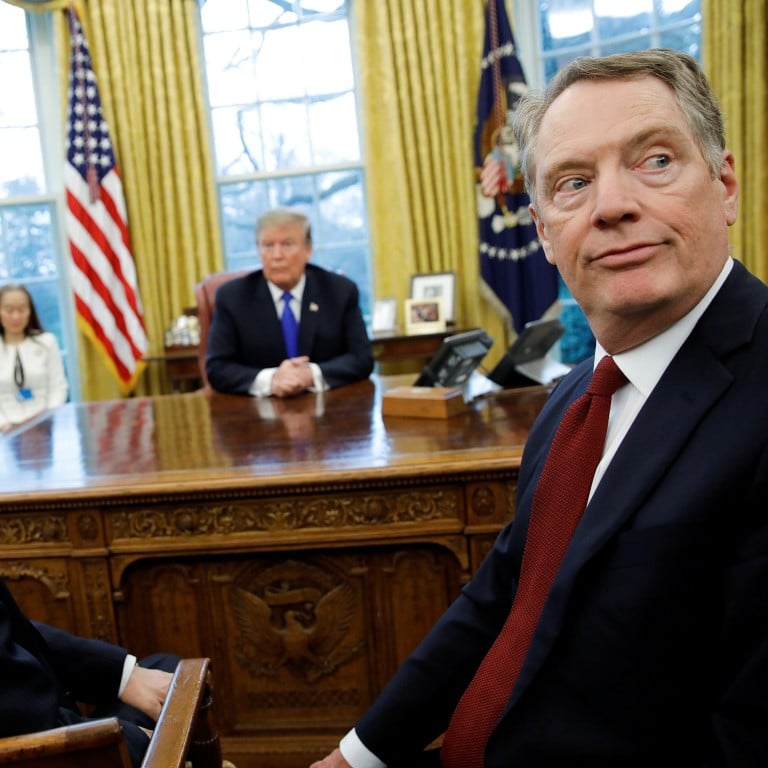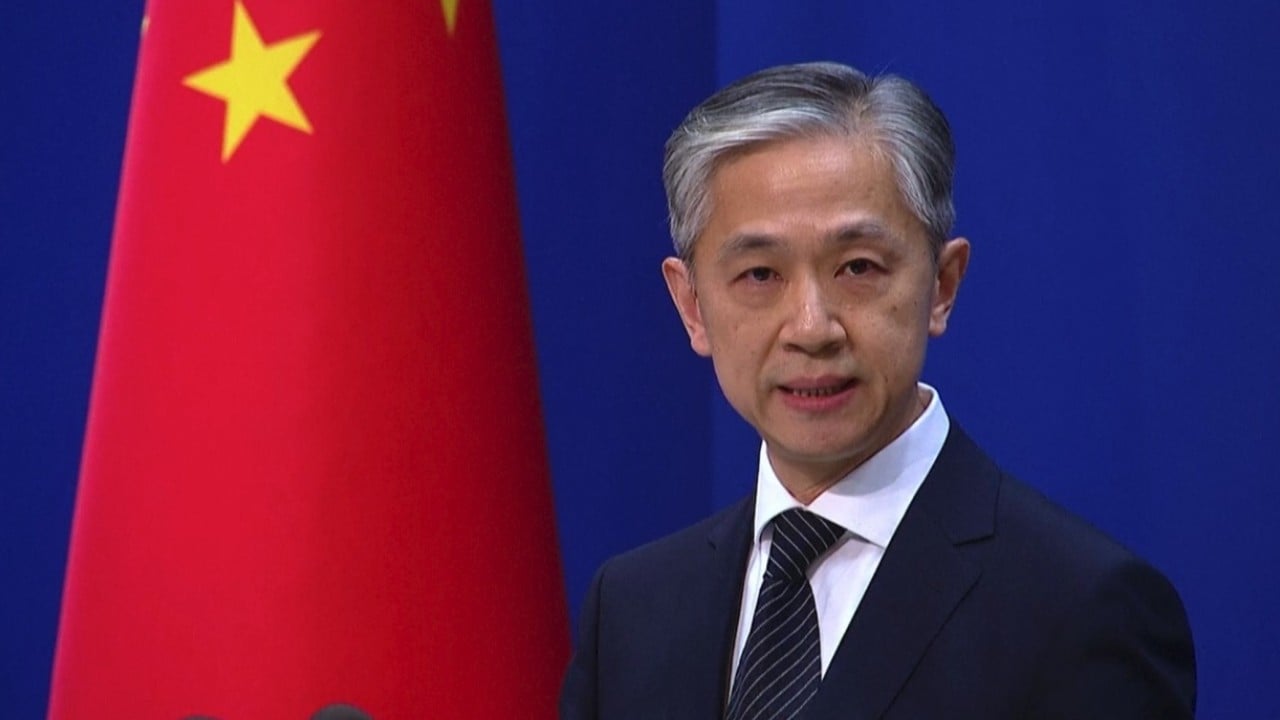
Does Joe Biden’s pick as the next US trade chief need to be a China hand?
- Some veteran diplomats urge Joe Biden to replace US Trade Representative Robert Lighthizer with someone well versed in China policy, calling relationship ‘the big enchilada’
- But others downplay the importance of direct experience, pointing to the agency’s expertise and wider awareness in Washington of the China challenge
In his three years as US ambassador to China under then-president Barack Obama, Max Baucus says he was often surprised by the lack of understanding about China among senior government colleagues in Washington.
“It was very clear to me that some of the people – the top cabinet secretaries, for example – did not have sufficient Chinese experience and did not sufficiently understand China,” said Baucus, who advised Joe Biden on China policy during his successful presidential election campaign.
Before US Trade Representative (USTR) Robert Lighthizer’s first trip to China, for instance, he called Baucus to pick his brain on “what he thought about China, and what sorts of tactics Beijing might apply” in negotiations. “I may be wrong here, but I don’t know that he had been to China prior to this. He certainly had not spent a lot of time in China,” Baucus said.
Now, Baucus believes that whomever replaces Lighthizer – the most well-known USTR in recent memory – should be better versed in the critically important bilateral relationship. “China is the big enchilada,” the former Montana senator said.
This is one school of thought in a lively debate on replacing Lighthizer, a renowned trade lawyer who built a career on protecting America’s steel industry from foreign competition, before becoming Donald Trump’s hawkish adviser on China.
In interviews with more than a dozen ex-US trade officials and diplomats, some said they want a China hand, fully versed in Beijing’s evolving model of state capitalism.
Beth Baltzan, a veteran USTR official and ex-democratic counsel to the House Ways and Means Subcommittee – whose name has been mentioned in some media reports as a possible candidate for the role itself – said that for too long “many trade experts had a lack of curiosity about how state capitalism itself works, and [about] how challenging it is for market-oriented firms to compete”.
“In my view, Biden will be best served by having someone who understands the relationship between a China trade strategy and the achievement of Biden’s domestic agenda, and that’s going to be a trade-policy expert with experience on China issues,” Baltzan said.
Others want a crack negotiator of any stripe, or a trade wiz such as Lighthizer who, as one former colleague in the Trump administration said, “can run circles around counterparts who did not have a trade background”.
But another viewpoint is that, given the volume of literature and level of awareness in Washington about China’s behaviour, prior in-depth experience covering China is not as vital as it may seem – particularly in a Biden administration that most pundits say is unlikely to be as focused on running down China’s trade surplus as Trump has been.
When Lighthizer arrived for his first official trip to Beijing, James Green – then the USTR’s minister counsellor for trade affairs at the US embassy in Beijing – met him at the airport. It was also Green whom Lighthizer sent to China’s Ministry of Commerce to deliver news of the first Section 301 tariffs that kicked off the trade war in July 2018.
Green says having China experience is not particularly needed for the next USTR, “and I say that as someone who has spent most of the last three decades in the place”.
He pointed to a Lighthizer testimony before the US-China Economic and Security Review Commission in 2010, in which he said “Chinese mercantilism has had devastating effects on the US economy”, to show that even if he had not been in and out of China his whole career, he had been thinking deeply about the issues for years.
“I think the most effective USTRs are ones who have a good relationship with the president and are knowledgeable about the intricacies of trade rules,” Green said.
“Lighthizer released a very comprehensive 301 report, and he got a lot of press, very effectively messaging that China’s economic model was threatening to the United States and the global trading system,” Green added. “And so, even for people who didn’t know anything about industrial policy three years ago, now there’s a level of fluency in these issues that there just wasn’t a couple of years ago.”
Green and others point to the existing China knowledge within the department and elsewhere in government. The office of the USTR has access, for instance, to CIA intelligence on China, as well as a whole raft of investigations by the Commerce, State and Treasury departments.
“[A China background] certainly couldn’t hurt. But I wouldn’t put it as a necessary qualification. The USTR has a bunch of career staff with China expertise, and the USTR plus his or her deputies can rely on them for guidance on China issues,” said Simon Lester, a trade policy expert at the pro-free-trade Cato Institute.
“The political appointees will set the broad policy agenda, but much of the policy substance is carried out by, and developed by, the career folks,” he added. “If you happen to find a potential senior political appointee with China experience, that’s great. But you can survive without it.”

01:00
China waits to congratulate Joe Biden on US election win
History suggests that the person chosen to be USTR has rarely been a “big issue” expert, with this generally being an afterthought.
Obama’s first pick – Ron Kirk – was the former mayor of Dallas with no prior trade experience. His appointment was seen as a way of conveying the benefits of global trade to Main Street by appointing a more relatable face than a career lawyer. Most people interviewed for this story viewed his tenure as forgettable.
Bill Clinton plumped for Mickey Kantor as USTR because he had been chairman of the Clinton-Gore campaign in 1992, and it was the “only cabinet position left for him”, according to one source who worked in the agency at the time.
And Bruce Aiken, who advised the Biden campaign on trade and recently co-authored the book Trade Crash: A Primer on Surviving and Thriving in Pandemics & Global Trade Disruption, noted that Kantor “had no background on trade at all”.
[Biden] does place a high value on expertise, so I think he will appoint people who bring a fair amount of experience
“They gave it to him because he wanted to be chief of staff, but they had already given that to Rahm Emanuel … So this kind of stuff happens in any transition,” Aiken added.
Those close to Biden expect him to take a more technocratic route in appointing his cabinet, including the USTR, even if “40 years in public service leaves a lot of favours to repay”, said one former official.
Francisco Sanchez worked with Biden as undersecretary for trade in Obama’s Department of Commerce and said that, over the course of his career as vice-president and senator, Biden always prioritised technical skills.
“He does place a high value on expertise, so I think he will appoint people who bring a fair amount of experience, whether it has to do with China, whether it has to do with [the European Union],” Sanchez said. “This is something that’s very important to him.”

